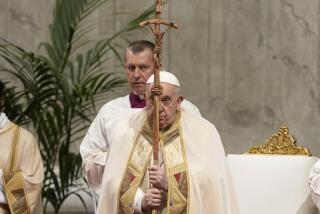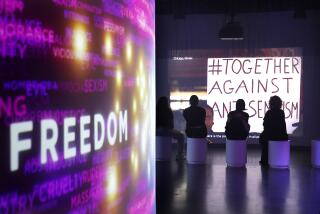Let Catholic and Jew Share Where We Hurt and Why
Some Jewish organizations, anguished over the failure of Polish Catholic officials to honor their agreement to remove a Carmelite convent from the grounds of Auschwitz, have issued an emotional appeal for the severing of relations between Jewish groups and the Vatican. I opposed such a policy when it was first proposed last spring and am even more critical of it today.
The practical effect of breaking off relations is to discontinue dialogue. Yet dialogue and discussion between Catholics and Jews are precisely what is needed today, not alienation and antagonism.
Three issues threaten to damage the progress in Catholic-Jewish relations that has been painstakingly made since the Second Vatican Council more than 20 years ago:
-- Recent statements by Pope John Paul II that appeared to denigrate the validity of God’s covenant with the Jewish people.
-- The Vatican’s persistent refusal to enter into diplomatic relations with Israel, while granting a Papal audience to PLO terrorist chief Yasser Arafat.
-- The dispute over the Carmelite convent in Auschwitz, which to Jews is symbolic of the most painful martyrdom in Jewish history. Two years ago the leading church authorities in Poland, Belgium and France--including Cardinal Franciszek Macharski of Krakow--agreed to relocate the convent by February of this year.
I believe that such issues can be resolved, but only by discussion and persuasion, not by threats and intimidation.
We have already had a glimpse of the forces of unreason and irresponsibility coming to the fore. The actions of a small group of militant Jewish demonstrators who scaled a wall and entered the Auschwitz convent’s yard, their brutal beating by Polish construction workers and the intemperate, blundering response by the highest church official in Poland are a forerunner of the consequences of formally breaking off communication and dialogue.
There is every reason to believe that responsible forces within the Catholic Church will see to it that the agreement to remove the convent is honored. The other issues are also susceptible of resolution--but only if we talk, patiently and calmly, each explaining to the other where we hurt and why.
The Catholic Church has acknowledged a need to reaffirm its fundamental kinship with Judaism. Jewish communities throughout the world need the Catholic Church as an ally against extremists of the left and right. This is particularly true of small Jewish communities like those in Latin America, where political instability is rampant.
Consider the experience of Brazil, where I have lived and worked since 1970. Brazil has more Catholics--140 million--than any other country in the world. Its Jewish population is 150,000. Despite this ratio of nearly 1,000 to 1, relations between Catholics and Jews in Brazil are a model of mutual recognition and respect.
This acceptance of religious differences in Brazil follows generations of mutual misunderstanding and distrust. The turning point came in 1975, when the prison torture and murder of Vladimir Herzog, a young Jewish journalist and university professor, aroused many segments of the Brazilian population, including Catholic Church leaders. It was the first step toward the redemocratization of Brazil, in which the church played an important role.
The new spirit of ecumenism led to recognition by Brazil’s Roman Catholic bishops of the importance of establishing closer ties with other religious groups, including Jews. A National Commission for Catholic-Jewish Dialogue was organized by the Bishops’ Conference, and met with Jewish community representatives over five years, culminating in the publication of an unprecedented document--a 187-page manual for promoting discussion between Catholics and Jews. The manual, distributed to every diocese and archdiocese in Brazil, has served as a text for Catholic-Jewish dialogue and become part of the life of the church and the Jewish community.
“Dialogue,” says the manual, “is the best way for overcoming prejudices. It is the best way for (Catholics and Jews) to know, listen and adopt new attitudes of respect towards each other.”
The Catholic Church and the Jewish community must keep in mind that in many places around the world, both groups are at risk from extremism and bigotry. Both of us need allies, even when we must differ with them. We wound ourselves and hurt the cause of freedom when we break ties that took so long to build and that promise hope of better relations and greater understanding after nearly 20 centuries of ignorance and fear.
More to Read
Sign up for Essential California
The most important California stories and recommendations in your inbox every morning.
You may occasionally receive promotional content from the Los Angeles Times.









